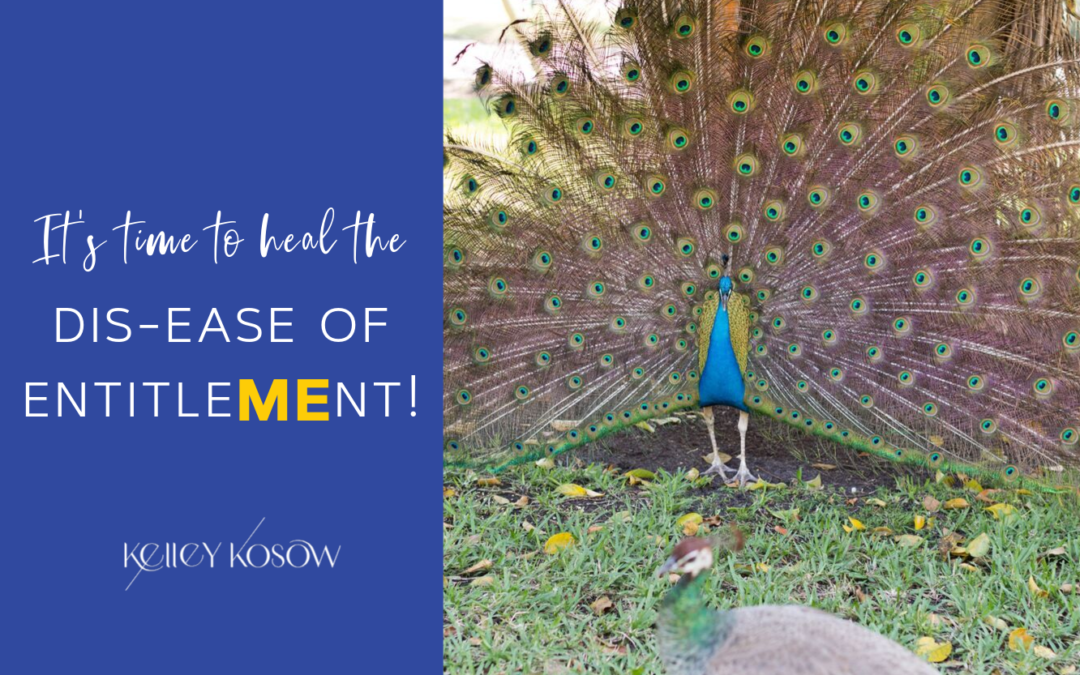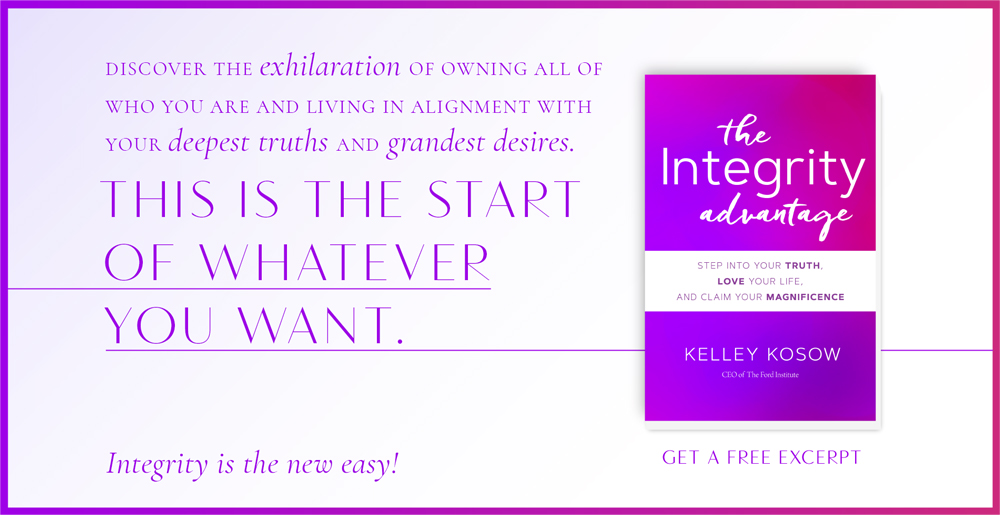Healing the Dis-ease of Entitlement
Lately I have been thinking a lot about the concept of entitlement — that feeling so many of us have that we are owed something, that we have rights or deserve something to be the way we think it should be. Think of the times you have thought or had someone say to you:
- “I deserve to be treated a certain way, given certain things, or taken care of in a particular manner, because I am your child, parent, or friend.”
- “You owe me because I was there for you.”
- “The Universe should reward or repay me because I am a ‘good person.’”
Although our sense of entitlement gives us feelings of control and power, they are often illusory. Ultimately, we are giving our power away to the people we believe “owe us.” And eventually we will become the victims of our own need to manipulate and control when the person we are trying to influence wakes up to the importance of honoring their own needs and wants as well as the realization living in their own truth is more important than trying to please or placate someone else’s desires.
Imposing our sense of entitlement upon others is a slippery slope. It is a setup for resentment by everyone involved. Inevitably it creates disconnection and divisiveness with the people involved and ultimately you alienate and push away the ones you were trying to keep close.
The good news is that the dis-ease of entitlement can be healed. If you are ready to let go of the bonds of entitlement and create a deeper sense of connection, compassion, and co-ownership in your relationships, then I invite you to delve into my four tips for healing the dis-ease of entitlement.
Tip #1: Unravel Your Story of Entitlement
We all have entitlement stories and justifications about why a person owes us what they do. Our stories of entitlement are often fortified by a lot of righteousness. So much so that we actually believe them to be facts. We convince ourselves that we are actually owed certain things as result of our birthright or a role we play.
I remember when my kids were teens and they saw their friends being given cars when they turned 16 years old. I had to remind them that “cars didn’t come with your birth certificate.” Although they understood, I am sure that there was a part of them that believed (and the community that they lived in confirmed) that children were entitled to that first set of keys upon passing their driver’s test.
To heal the dis-ease of entitlement, the first thing we must do is unravel our stories of entitlement. We must to distinguish between the facts of the relationship — she is my daughter, he is my partner, they are my parent or friend — and the beliefs we hold about what we are owed or deserved as a result of those relationships. We need to ask ourselves questions like:
- What do I believe my parents owe me even though I am grown?
- How do I think I should be rewarded by the Universe just because I am a kind and honest person, help others, live a clean life, etc.?
- What are the mandates I impose upon my friends or family in terms of how they should be acting or doing for me?
As you start to unravel your entitlement stories, allow yourself to not only see the conditions you are putting on your relationships but also the impact those conditions are having.
Tip #2: Distinguish Between Entitlement and Expectations
Although expectations have gotten a bad rap in our society and many a mantra tells us to “Exhale expectations and inhale intention,” when delving into this inquiry about entitlement, it’s important to take a fresh look at expectations. Expectations can be healthy and useful, especially if they support us in understanding the dis-ease of entitlement.
The fact is that we are all human and as long as we are in relationship, there will be certain expectations we have of the people we are in relationship with. We expect or hope that our loved ones will treat us with respect, love, and kindness. Expectations, especially when communicated, agreed upon, and reciprocal, are a truly positive. They:
- are a recognition and honoring of our and the other person’s needs and wants, and
- serve as shared guidelines for the highest vision of the relationship.
Bottom line, healthy expectations are grounded in the “we” and founded upon the consideration of what is best for all of the parties of the relationship. They can and should be adjusted, especially if they go unmet and cause pain. On the contrary, entitlement is all about one person. It is grounded in the “I” and is uncompromising, causes polarization, and promotes dis-ease.
Understanding that expectation says, “I need or would like you to,” whereas entitlement says, “You owe me,” we are left with the greatest gift of all — the gift of choice. We can hold on to our sense of entitlement or commit to empowering healthy expectations in our lives and relationships.
Tip #3: Step Into Your Next Level Of Trust and Responsibility
Although masked with an air of power, underneath our sense of entitlement lie feelings of fear, insecurity, lack, doubt and unworthiness. We are not trusting in ourselves, the people around us, or the Universe. We fear that if we don’t wield our sword of entitlement, we won’t get what we want, will lose love, will have to do it for ourselves, might not have what it takes to succeed, or will end up alone.
To heal the dis-ease of entitlement, we must:
- Get radically honest about our lack of trust, embrace our feelings of fear and doubt, and have compassion for the young child inside of us who still feels insecure, unworthy, not good enough and replaceable.
- Get real about what it really is we are trying to get from others. Are we trying to get them to love us, take care of us, or do it for us?
- Trust that whatever we are uncovering is coming up for a reason. It is coming up because we are meant to have a deeper understanding about something that is still unhealed inside of us. Maybe we are meant to learn more about unconditional love, faith, or even our own greatness.
- Take responsibility for giving ourselves what we are looking for from others. When we take responsibility for meeting our own needs, not only will our need to control diminish but our underlying fear and insecurity will diminish too as we begin to trust that we are capable of filling our own cup.
Tip #4: Practice Gratitude
As always, being grateful for what we have is a key ingredient in letting go of our tendency to want more from others. Appreciating how people do show up and focusing on the 90 things they do right instead of the 10 they do “wrong” helps loosen the bonds of entitlement and frees everyone from being the victim of the relationship.
So, this week I invite you to join me in this inquiry of entitlement in relationships. Delve into the transformational action steps below, and let me know how you are healing the disease of entitlement.
Transformational Action Steps
(1) Unravel Your Stories of Entitlement.
- Make a list of the relationships in which you feel others owe you. Write down who they are, what you believe you owe them and what you believe is the cost or consequence if they don’t deliver or show up as you believe they should. How do you react toward them? Do you push them away, withhold love, or punish them in some way?
- Make a list of the relationships in which you feel others believe that they are owed something by you. Take note of who they are, what they believe you owe them, how you react, and how it makes you feel.
(2) Distinguish Between Entitlement and Expectations. Start busting through your stories of entitlement. How have your expectations about what you are owed by others become righteous and uncompromising? Allow yourself to begin to feel the cost of entitlement. How does it make you feel? How does it impact your relationships?
(3) Step Into Your Next Level Of Trust and Responsibility. Going deeper, look at:
- Your trust issues: What are the fears and insecurities that have you impose your sense of entitlement on others?
- The lesson that is available: What you are supposed to be learning?
- The next level of responsibility: What do you need to give to or do for yourself, so you won’t have to impose it upon others?
(4) Practice Gratitude. Start looking at the all the ways the people in your life do show up for you and demonstrate their love for you. Let what you find coat your consciousness and blanket you with the knowing that you are loved!



